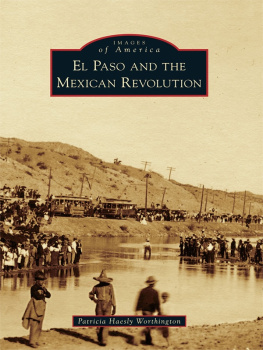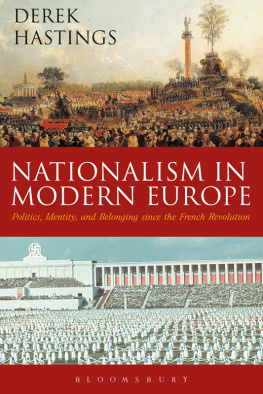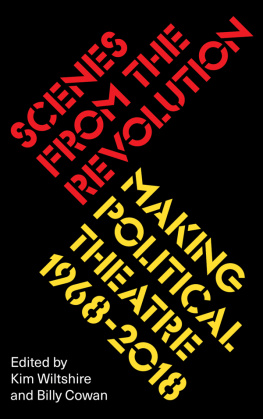2016 by the University of New Mexico Press
All rights reserved. Published 2016
Printed in the United States of America
21 20 19 18 17 16 1 2 3 4 5 6
The Library of Congress has cataloged the printed edition as follows:
Names: Sheppard, Randal, 1981 author.
Title: A persistent revolution : history, nationalism, and politics in Mexico since 1968 / Randal Sheppard.
Description: Albuquerque : University of New Mexico Press, 2016. | Includes bibliographical references and index.
Identifiers: LCCN 2015028438 | ISBN 9780826356819 (cloth : alk. paper) | ISBN 9780826356826 (electronic)
Subjects: LCSH: NationalismMexicoHistory. | MexicoHistory1946 | MexicoPolitics and government19701988. | MexicoPolitics and government19882000. | MexicoPolitics and government2000
Classification: LCC F1226.S515 2016 | DDC 972/.08/35dc23
LC record available at http://lccn.loc.gov/2015028438
Cover photograph courtesy of the author
ACKNOWLEDGMENTS
This book is the product of a long journey that began when, as an undergraduate, I plucked up the courage to visit the office of Barry Carr at La Trobe University in Melbourne, Australia, to discuss my interest in Mexican history and politics. Barry proved to be a more knowledgeable, patient, supportive, and generous guide than I ever could have hoped for. His suggestions, advice, and friendship during the preparation of this book have been invaluable and I cannot do justice here to his impact on my formation as a historian of Mexico other than simply to offer my gratitude.
I also had the great fortune to study under the guidance of Claudia Haake in the La Trobe History Program. Claudia demonstrated unflagging dedication to encouraging and advising me in my work and, possibly excepting me, Claudia has spent more time and energy than anyone poring over and commenting on the chapters of this book with precision and humor. Claudia has also always been a font of wisdom when it came to conference papers, journal articles, and lecturing, as well as great company when we have met up in various parts of the world. Without both Barry and Claudia, this book would certainly not have been possible and the only way I can begin to repay them for their continuing support is to dedicate this book to both of them.
The research in this book was made possible by an Australian Postgraduate Award scholarship and a La Trobe University Research Travel Grant. I would like to thank everyone in the La Trobe History Program who supported me in my teaching and research activities, including (but not limited to) Richard Broome, Roland Burke, Philip Bull, Ian Coller, Diane Kirkby, Tim Minchin, and Ingrid Sykes. A further thanks to David Harris for reading through my work and giving feedback, as well as everyone who participated in the history seminars in which I had the opportunity to present and discuss my research. I must also make a special mention of the crack administration team during my time there, Udani Gunawardena and Anita Allen.
The seminars and other activities of the Institute of Latin American Studies (ILAS) at La Trobe University provided me opportunities to present my research and receive feedback as well as benefit from the work of a wide range of international scholars. I therefore acknowledge the dedicated team of people, including Barry Carr, Stephen Niblo, and Ralph Newmark, who have kept ILAS going. I would also like to especially thank Isabel Moutinho from the Spanish Program.
At the University of Cologne, I want to thank above all my colleagues Aribert Reimann and Elena Daz-Silva for their support, advice, and friendship as I prepared this book. My gratitude also to everyone at the Instituto de Historia Ibrica y Latinoamericana (IHILA) in Cologne for providing opportunities to engage with scholars on Latin American topics. In particular, my thanks to Barbara Potthast.
I am furthermore exceedingly grateful to Vctor Macas-Gonzlez for the thoughtful engagement, detailed suggestions, and new perspectives he offered for this book, as well as for his general enthusiasm and encouragement. A big thank you, also, to Linda Hall for her comments and suggestions on this manuscript. For their rigorous and critical engagement with the research that led to this book, I also thank Jeff Browitt, Kevin Middlebrook, and Mauricio Tenorio-Trillo.
Thank you also to everyone in Mexico who helped me with my research and life in general in Mexico City during my year there and subsequent trips researching this book. In particular, my gratitude to the tireless staff at the Biblioteca and Hemeroteca Nacional who obliged my requests for newspapers based on a nationalist commemorative rather than more conventional standards of chronology. I also owe a debt of gratitude to Melbourne-based Victor del Rio for the time and effort he put into organizing my time as an International Observer during the 2012 Mexican presidential elections, as well as for all the conversations about Mexican politics.
A very big thank you to Clark Whitehorn and everybody at the University of New Mexico Press for all their hard work, enthusiasm, and patience. These include Jessica Knauss, Elizabeth Hadas, Katherine White, and Lisa Tremaine. Thank you also to the reviewers for their suggestions on how to improve the book.
I am much indebted to all my friends and family who have accompanied me in various ways as I have bounced between Australia, Mexico, the United States, Germany, and elsewhere in recent years. I wont name names in fear of leaving someone out, but I do want to offer an extra special thank you Damir Mitric and Michelle Carmody for the conversations, long lunches, and general mutual support that were intertwined with the experience of researching and writing this book.
Finally, thank you to my parents, without whose support none of this would have been possible.











